I have these boot drives, I want to copy them to another. They both happen to be zroot and bootable.
I booted from mfsBSD and imported both new and old zroot, using the pool ID shown by zpool import -N.
root@mfsbsd:~ # zpool import -N
pool: data01
id: 2668514456528412656
state: ONLINE
action: The pool can be imported using its name or numeric identifier.
config:
data01 ONLINE
mirror-0 ONLINE
gpt/S59VNS0N809087J_S00 ONLINE
gpt/S59VNJ0N631973D_S01 ONLINE
mirror-1 ONLINE
gpt/S5B3NDFN807383E_S02 ONLINE
gpt/S5B3NDFN807386P_S03 ONLINE
pool: zroot
id: 18320603570228782289
state: ONLINE
action: The pool can be imported using its name or numeric identifier.
config:
zroot ONLINE
mirror-0 ONLINE
da0p3 ONLINE
da1p3 ONLINE
pool: zroot
id: 3940978777956737756
state: ONLINE
action: The pool can be imported using its name or numeric identifier.
config:
zroot ONLINE
mirror-0 ONLINE
ada0p3 ONLINE
ada1p3 ONLINE
root@mfsbsd:~ #
I imported and mounted both:
# zpool import -R /oldpool 3940978777956737756 oldzroot # zpool import -fR /newpool 18320603570228782289 zroot
Next: send the data.
snapshot for send
With this command, I snapshot the old zroot for copying to the new zroot.
zfs snapshot -r oldzroot@for_copy
zfs send | zfs recv
This is the copy from old to new:
root@mfsbsd:~ # zfs send -R oldzroot@for_copy | zfs recv -F zroot cannot mount 'zroot': mountpoint or dataset is busy
The cannot mount message results from having zroot mounted. It is not an error.
scrubs
After copying over the data, I run scrub on both pools. Notice the difference in time.
I think most of this difference is drive-related. The oldzoot is attached to the M/B. The new zroot is attached to the HBA.
We comparing INTEL SSDSC2MH120A2 (oldzroot) and ATA Samsung SSD 860 4B6Q. I think the difference in drives makes up for the difference in hardware connections.
The real test would be swapping the drive connections and see how they perform.
These are OS boot drives, not data drives. I think this will be fine.
root@mfsbsd:~ # zpool status zroot oldzroot pool: oldzroot state: ONLINE scan: scrub repaired 0 in 0 days 00:04:51 with 0 errors on Sun Oct 11 14:03:46 2020 config: NAME STATE READ WRITE CKSUM oldzroot ONLINE 0 0 0 mirror-0 ONLINE 0 0 0 ada0p3 ONLINE 0 0 0 ada1p3 ONLINE 0 0 0 errors: No known data errors pool: zroot state: ONLINE scan: scrub repaired 0 in 0 days 00:02:27 with 0 errors on Sun Oct 11 14:01:09 2020 config: NAME STATE READ WRITE CKSUM zroot ONLINE 0 0 0 mirror-0 ONLINE 0 0 0 da0p3 ONLINE 0 0 0 da1p3 ONLINE 0 0 0 errors: No known data errors
The real test
The real test however, is booting from the new drives.
The problem: the recently flash into IT-mode HBA card was not bootable because I did not do the Optional: Boot Images section of the instructions. I went back later and did that.
After adding the Boot Image, I was able to see this when booting:
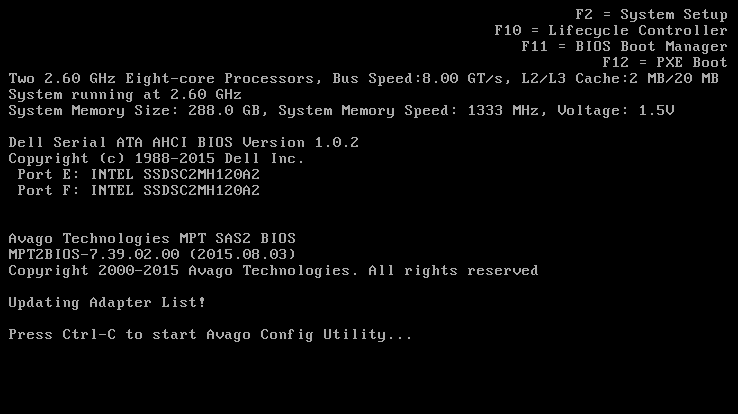
Pressing ctrl-c will take you to this window:
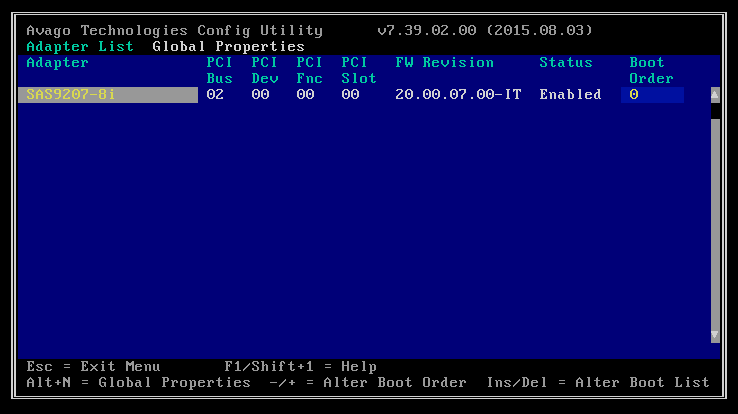
Pressing Enter on SAS9207-8i I was presented with this screen:
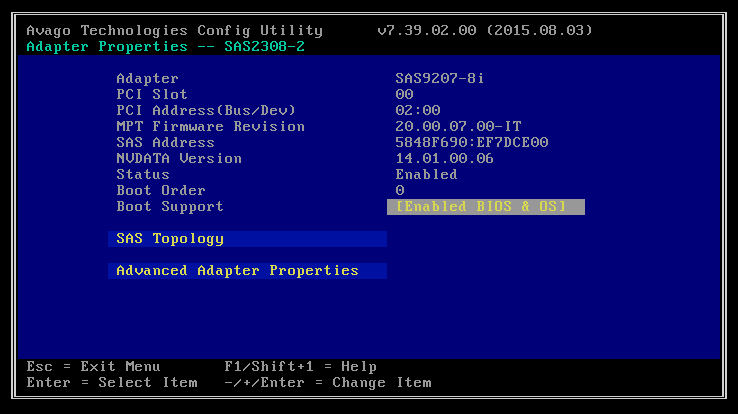
The key: Boot Support. I am booting via BIOS (as opposed to UEFI).
After leaving the configuration tool, the boot continued. I took this screen shot which shows the drives attached to the HBA:
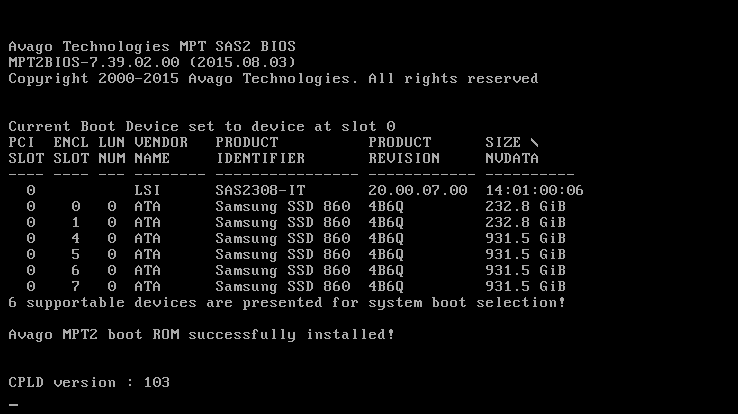
In my case, to boot from those devices, I selected F11 and then from the BIOS Boot Manager screen, I selected the devices from which I wanted to boot.
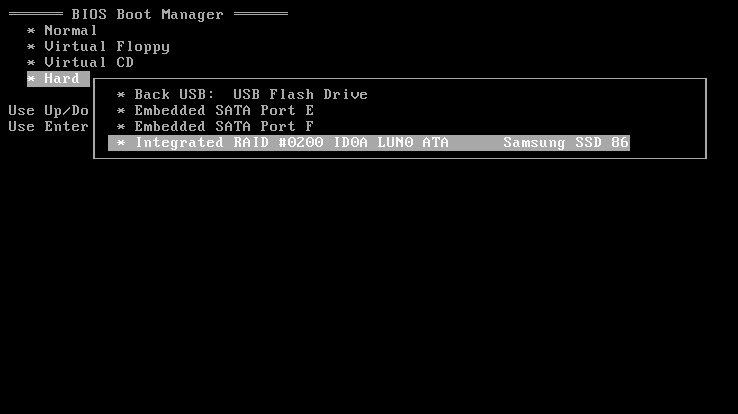
However, from there, it failed.
Boot failure
When I tried to boot, I got this:
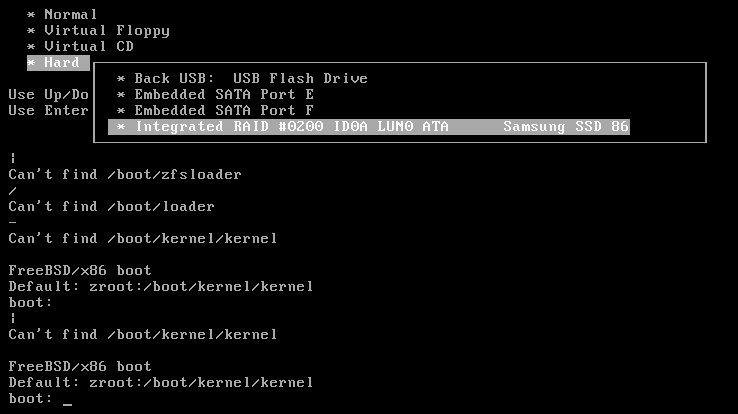
Setting bootfs
When copying around ZFS snapshots, not all attributes are copied. This include the zpool attribute bootfs. This is how I set that.
I booted the system via mfsBSD.
I imported the zroot, by ID, because this system has more than one zroot zpool on it.
# zpool import -R /newzroot 18320603570228782289
Then tell the zpool where to boot from:
# zpool set bootfs=zroot/ROOT/default zroot
Export the zpool:
# zpool export zroot
Reboot, success
The system was rebooted again, press F11 to select the appropriate drives, boom, into FreeBSD.
This proves the drives can boot the system.











